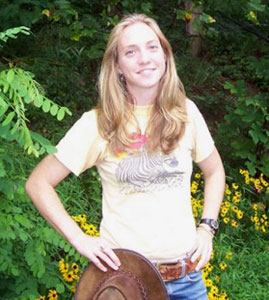ALUMNA SERVES HER COMMUNITY AS COUNSELOR WITH CENTRAL PA WILDERNESS OUTREACH PROGRAM

Details
She had worked with refugees in Rwanda as an intern with the Center for Peace and Global Citizenship, and taught outdoor skills to public school children as an instructor at Farm and Wilderness in Plymouth, Vt., so it's no wonder that Heidi Witmer '02 was seeking a“stimulating and interesting job” when she moved back to Perry County, Pa. And that's what she found, as a counselor at the Tressler Weekend Alternative Program (WAP) in Boiling Springs, Pa.
WAP is a wilderness outreach initiative for adjudicated teenagers from central and southeastern Pennsylvania. It is called an“alternative” program because it is just that—an alternative to lockup. During the week, the kids work with a therapeutic team of trusted adults. Then, over a course of 10 weekends, they head for WAP's wooded campus to eat and sleep outside, learn to cook food over an open fire, canoe down the Susquehanna River, hike, climb high ropes, and participate in needs-based counseling to deal with such issues as grief, loss, and anger management.
Witmer functions as a primary wilderness counselor:“I'm a consistent adult in their lives.” She deals mainly with teen girls ages 14 to 18 in small groups. On a typical weekend, Witmer spends Friday evening helping her girls reflect on the past week, then serves as their wilderness instructor all day Saturday. Before the girls leave Sunday morning, Witmer has assisted them in mapping out goals for the week ahead.
“It's amazing to see what these young people can do in 10 weekends,” she says.“When they graduate, you see how choked up they get before they leave, and when they thank you specifically for what you've done.”
WAP's success is reflected in the fact that many graduates manage to stay permanently out of the court system. In fact, two of Witmer's co-workers are former WAP participants.
Witmer, herself, has found her time with WAP to be both mentally and emotionally satisfying.“This is a challenging form of teaching,” she says.“And these kids know who they are and where they're at, and have a clear understanding of what it takes for them to survive.”



